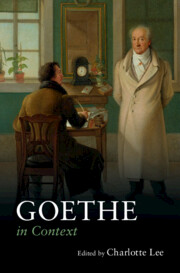Book contents
- Goethe in Context
- Goethe in Context
- Copyright page
- Contents
- Illustrations
- Notes on Contributors
- Acknowledgements
- Note on Translations and List of Abbreviations
- Chronology
- Introduction
- Part I Life and Times
- Part II Literature
- Part III Art
- Part IV Philosophy and Science
- Chapter 19 Goethe and Philosophy
- Chapter 20 Goethe’s Improper Mode of Thought
- Chapter 21 Goethe and German Idealism
- Chapter 22 Morphology
- Chapter 23 Colour Theory
- Chapter 24 Geology
- Part V World Cultures Inspiration and Reception
- Part VI Goethe’s Lasting Significance
- Further Reading
- Index
Chapter 21 - Goethe and German Idealism
from Part IV - Philosophy and Science
Published online by Cambridge University Press: 16 May 2024
- Goethe in Context
- Goethe in Context
- Copyright page
- Contents
- Illustrations
- Notes on Contributors
- Acknowledgements
- Note on Translations and List of Abbreviations
- Chronology
- Introduction
- Part I Life and Times
- Part II Literature
- Part III Art
- Part IV Philosophy and Science
- Chapter 19 Goethe and Philosophy
- Chapter 20 Goethe’s Improper Mode of Thought
- Chapter 21 Goethe and German Idealism
- Chapter 22 Morphology
- Chapter 23 Colour Theory
- Chapter 24 Geology
- Part V World Cultures Inspiration and Reception
- Part VI Goethe’s Lasting Significance
- Further Reading
- Index
Summary
Chapter 21 examines Goethe’s relationship to German Idealism. Although the speculative nature of the Idealist method appears alien to Goethe’s own thought, and he himself expressed reservations about it, his poetic and scientific works display a significant degree of sympathy with the concerns that motivated his contemporaries. The chapter highlights the importance of Spinoza in the alignment between Goethe and Idealist thought, before considering in detail the significance of Kant, Fichte, Hegel and above all Schelling, whose philosophy of nature and art is particularly resonant with Goethe’s own.
- Type
- Chapter
- Information
- Goethe in Context , pp. 206 - 215Publisher: Cambridge University PressPrint publication year: 2024

